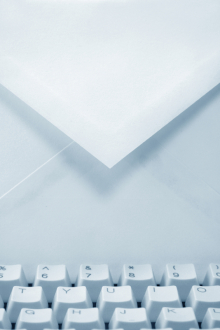How often should you check your e-mail?
Datum: 2011-11-16 11:00

A question I frequently get when I am out lecturing is how often you should go through your e‑mail. My guess is that what makes this such a common question is that people are curious of what the optimal frequency is, objectively speaking.
Sometimes the person posing this question also expresses a suspicion of that there is a common general expectation of how quickly you should reply to e‑mails you receive and how “far behind” it is OK to fall in your correspondences.
Not so bad
I believe that e‑mailing is becoming an increasingly important and central tool to most of us.
And to be frank, it has its merits. You can convey your message to someone even if the person in question is neither physically present nor reachable by phone.
You can send large quantities of information fast and you get a written transcript of the communication automatically, as opposed to when discussing a matter over the phone.
Hurry-scurry! (Or perhaps not?)
But the e‑mail also appears to be stressful for many people. If we were free from obligations concerning the e‑mails we receive, we wouldn’t have any problems, but as we are implicitly expected to reply to them, we tend to get stressed when the number of unread e‑mails is increasing faster than we are able to read and deal with them.
So how often is often enough when it comes to emptying the e‑mail inbox and how quickly must we reply?
The answer is straight-forward and ambiguous simultaneously: There is no universal truth, it depends.
What does it depend on?
It depends on:
- What your corporate culture is. How fast do your colleagues reply to e‑mails? Do you have some form of explicit policy concerning how available by e‑mail you are supposed to be? In the companies and businesses I meet in my work, the culture and norms regarding e‑mailing differ. In some companies you “have to” answer within an hour, while others are not in the same hurry.
- How quickly you have replied in the past. The people you have correspondence with by e‑mail tend to quickly get used to how frequently you have replied in past communication. If you reply almost instantly for a while and then suddenly have a few days off, the person you are corresponding with might call you to ask “Where did you go? Did you get my e‑mail? Did you read it?”. If you tend to reply swiftly, make sure to create an out-of-office-message which specifies when you will be unavailable or away on a business-trip (and thereby unable to attend to your e‑mails).
- Your role in the company. If you are responsible for a large quantity of the customer contact, it is obvious that the faster you reply to e‑mails, the better it is.
- What your other responsibilities and assignments are. The only person able to make the correct priorities amongst all the things you need to do is you since you are the only one with a complete overview of your situation. If you have high priority tasks which you need to work on without interruptions for a longer stretch of time, empty your inbox less frequently.
- Your values and ambitions. If it is extra important to you to be available by e‑mail and it harmonizes with what you stand for, check and empty your email at more frequent intervals.
Do this
- Since there are no rules or regulations regarding this matter, try checking your account at different intervals until you find one which suits you. I have clients who check their e‑mail twice a day (in the morning and in the afternoon), others who check it once an hour, and those who practically have the e‑mail window open at all times.
- Define and aim for a specific time period within which you will reply to the sender, if only with a “Thank you for your e‑mail, I will look into it further when I have time later this week”.
- Decide to stick to this e‑mailing policy of yours throughout the rest of the week.
- Create a reminder in your to-do-list so that you on Friday afternoon evaluate how you think sticking to the plan went.
- If you need to, adjust the policy and try it again next week, after which you evaluate it again.
It’s your call
If you decide how you want to handle your e‑mailing, you are no longer at a loss when trying to cope with the constant inflow of e‑mails. You have gotten a handle on the situation and started defining your unique way of working.
If you haven’t already, try checking the inbox at lower intervals, for instance every other hour. When you do check your e‑mail, process the incoming e‑mails immediately, that is, reply to those which need a quick and short reply, make to-do-tasks out of those which you don’t have time to deal with now and save those which you will need to keep. Make sure to throw away those which you no longer need.
You will then be able to work with greater focus and concentration on the tasks which have nothing to do with e‑mailing and the e‑mailing tool itself will be less associated with stress, tension and frustration.
What’s your way?
How often do you check your e‑mail? Do you have some kind of aim as to how quickly you will reply to the e‑mails you receive? If you succeed in sticking to that time-frame, what would you say determines your success? Leave a comment to let the world know your best tip!




